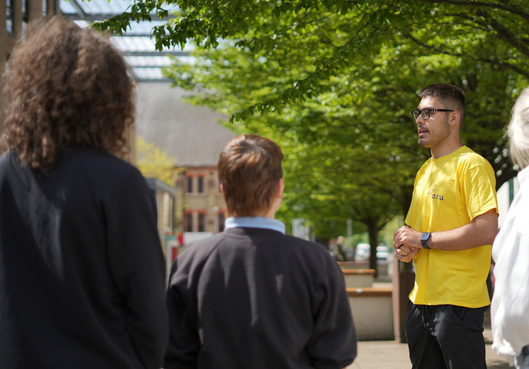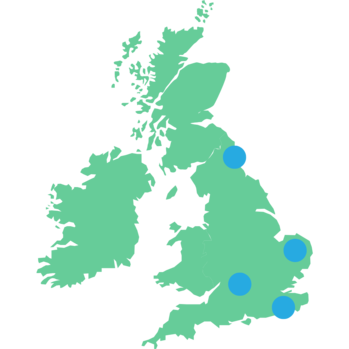A holistic approach to career options and pathways


Careers Education, Information, Advice and Guidance (CEIAG) in schools is currently in the spotlight. The general consensus is that, following years of underfunding and cuts to services, it is not able to give young people the support they need - particularly in relation to vocational pathways. Apprenticeships are rightly increasing in prominence as a real opportunity for young (and older) people to be at the forefront of the skills revolution, with vocational training vaunted by MPs and business leaders alike as the solution to a rapidly evolving jobs market; but this will only happen if they are properly supported, something we wrote about recently during National Apprenticeships Week.
If the government’s push to increase the visibility, availability and credibility of apprenticeships as an alternative to a university pathway is to work, there needs to be a seismic shift in its approach to CEIAG in schools. A recent UCAS study found that just 4% of students linked the word ‘prestigious’ to apprenticeships, while 76% linked it to traditional university degrees. Perhaps worse, nearly a third (31%) of students said it was very easy to access information about university, while just 6% said the same about apprenticeships, a gap acknowledged by Robert Halfon MP, Chair of the Education Committee:
“Despite the great efforts of all those individuals and organisations involved in providing careers guidance and support, the truth is that careers guidance policy is not for purpose in this country. We will never create a parity of esteem between vocational and technical skills and academic learning until we change the culture of careers.”
The bias is in the room
Halfon isn’t the only one who’s picked up on the disparity between academic and vocational pathways in careers education. A recent blog on the Careers Network site sparkles with indignation, with the anonymous author suggesting that teachers advising students are, understandably, ill-equipped to talk authoritatively about vocational routes:
“The overwhelming majority of secondary school teachers have been through the academic system. The majority of teachers have a PGCE and a Bachelor’s degree. A few have Masters and above. Teachers are most confident in explaining the bachelor’s degree route over any other route. Therefore, it is no surprise that teachers can explain their own lived experience of the academic pathway compared to a vocational pathway. They have no knowledge and experience of the vocational pathway.”
This lack of lived experience clearly makes it harder for teachers to be able to provide authentic advice about apprenticeships and vocational routes, compared with full-time-study options. There is a risk that the advice students receive is unbalanced, and that they will not be able to make key decisions with the full knowledge of the range of opportunities available to them.
Which brings us neatly on to the thorny subject of FE. Apprenticeships aside, this is where most vocational 16+ education is available. If the skills revolution is to take place, irrespective of pathway, the chronic underfunding of FE must be addressed. Funding per student aged 16-18 in further education and sixth-form colleges fell by 14 per cent in real terms between 2010 and 2019. The £400 million of extra money allocated to colleges and sixth forms in 2020-21 at best returns funding 2018-19 levels. But with growth in 16-18 student numbers in during the pandemic, this won’t have made a material difference.
The problem having been identified, wheels are already in motion to sort things out. The government's own Education Committee has launched an inquiry to work out how to improve things in CEIAG land. The recent news that the Baker Clause is now legally enforceable is certainly very welcome and will go some way to redressing the balance. So how does Villiers Park fit into all this?
Making informed choices
Let’s get one thing straight: Villiers Park is not a careers advice service. We help young people from diverse backgrounds to envisage all their future selves, the possibilities and potentials available to them, and support them in building a plan to follow the education and career pathways they choose. That involves equipping them to roll with the unforeseeable metaphorical punches that careers inevitably bring.
Modern careers are not “set and forget” things. Jobs for life are a thing of the past: a recent FutureLearn survey found that 21% of UK working age adults do not expect to be working in the same industry by 2030. People also change careers more frequently when they are younger. The Covid-19 pandemic has rapidly accelerated existing trends in remote work, e-commerce, and automation. The workforce is rapidly having to adapt to these changes, and this is reflected in an increased interest in career transition and re-skilling. Flexibility is key.
Change is the only constant
The keyword here is change, so whilst our Programme supports young people to think about the pathway choices that are right for them now, we are also concerned with helping them to develop the skills and tools - confidence, curiosity, tenacity, resilience - that enable them to make informed choices in their futures when things, inevitably, change.
Young people need a holistic approach to explore and steer their way through career options. The possible selves model, on which our Programme is based, broadens the range of potential futures available to young people. Having confidence in a clear pathway to achieving ambitions helps increase motivation and resilience, and therefore increases the likelihood of young people achieving careers that are meaningful to them - and having the confidence and self-belief to change course if they need or want to, for whatever reason. In a virtuous circle, increased confidence, motivation and resilience can also support raised attainment and other positive outcomes, smoothing the pathway to students’ desired goals.
We’re not the only ones to think that providers need to take a longer view of education and careers. In a recent piece for FE News, Olly Newton, Executive Director at the Edge Foundation, decries the short-sightedness of using metrics such as league tables and exam results to measure success:
“Success is about more than short-term achievements - it should provide a rounded picture of individuals’ long-term goals, career success, personal fulfilment and contribution to society.”
Their recent report also finds that young people’s progression pathways are impacted by their characteristics, abilities and background. Unsurprisingly, it shows that young people from disadvantaged backgrounds (measured by eligibility for free school meals) were less likely to be in sustained employment or education at all ages up to 30.
Long-termism starts with career options, guidance and support while still in education. It starts with honest discussions with young people about what it is that they want to do now whilst having an eye on the future, and helping them to develop the transferable skills that are the bedrock of modern careers. That’s certainly the view of Sir Charlie Mayfield, the former chairman of John Lewis who now runs the digital training company QA, who recently said that what employers really value is resilience, communication and problem-solving skills. Those are certainly not the preserve of HE.
Careers Knowledge + Self Knowledge = Success
We talk increasingly about bringing our whole selves to work. This can only be achieved if we are shown the whole menu for becoming ourselves. This is why, through our Future Leaders Programme, we take a holistic approach to young people’s development. Reliable and informed advice, experience, and expanded horizons are vital to career success (or other kinds of life outcomes). By supporting our students to connect their career plans with their personal goals and values - and develop attributes like resilience, motivation and self-efficacy - we greatly increase their capability to achieve the outcomes that are most important to them. Only when personal capacities and expanded knowledge about their options align can young people make the best decisions. Seeing increasing numbers of the young people we work with selecting vocational pathways and apprenticeships as the clearest route to the outcomes they want is evidence that our approach is working.
Our Impact








